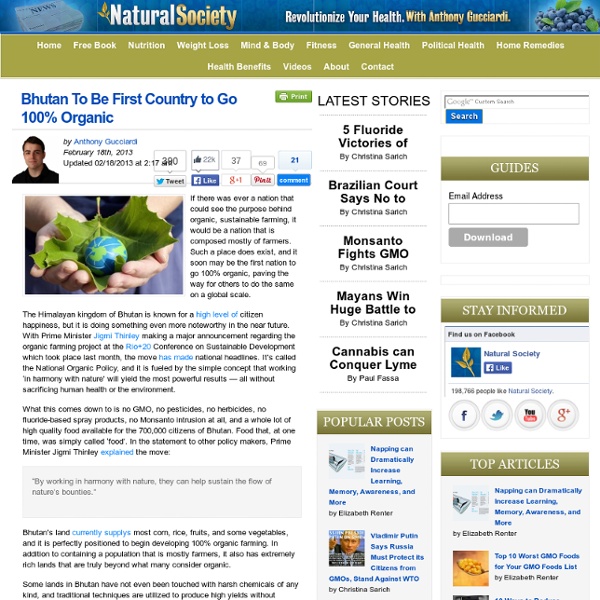Bhutan To Be First Country to Go 100% Organic
If there was ever a nation that could see the purpose behind organic, sustainable farming, it would be a nation that is composed mostly of farmers. Such a place does exist, and it soon may be the first nation to go 100% organic, paving the way for others to do the same on a global scale. The Himalayan kingdom of Bhutan is known for a high level of citizen happiness, but it is doing something even more noteworthy in the near future. What this comes down to is no GMO, no pesticides, no herbicides, no fluoride-based spray products, no Monsanto intrusion at all, and a whole lot of high quality food available for the 700,000 citizens of Bhutan. “By working in harmony with nature, they can help sustain the flow of nature’s bounties.” Bhutan’s land currently supplys most corn, rice, fruits, and some vegetables, and it is perfectly positioned to begin developing 100% organic farming. Australian adviser to Bhutan, Andre Leu, explains:
What is Libertarian? | The Institute for Humane Studies
The libertarian or "classical liberal" perspective is that individual well-being, prosperity, and social harmony are fostered by "as much liberty as possible" and "as little government as necessary." These ideas lead to new questions: What's possible? What's necessary? Below are a number of different takes on the libertarian political perspective from which you can deepen your understanding; also be sure to check out the videos in the sidebar. According to The Machinery of Freedom by David Friedman, Open Court Publishing Company, 1973. The central idea of libertarianism is that people should be permitted to run their own lives as they wish. According to Libertarianism: A Primer by David Boaz, Free Press, 1997. Libertarianism is the view that each person has the right to live his life in any way he chooses so long as he respects the equal rights of others. According to Funk and Wagnall's Dictionary According to American Heritage® Dictionary of the English Language: Fourth Edition, 2000.
liberty
UK government bans GMOs from its own Parliament restaurants while telling public to embrace genetic poisons
(NaturalNews) Since the mid-to-late 1990s when genetically-modified organisms (GMOs) were first being thrust onto the market by governments working in lockstep with the biotechnology industry, the U.K. Parliament has effectively barred their use in all food items served to government officials at Parliament restaurants, according to new reports. This, despite the fact that prominent elected officials in the U.K. are right now pushing GMOs on a public that is largely opposed to them, effectively shining the spotlight on their own insane hypocrisy with regards to the GMO issue. As recently reported by the U.K.' Paterson, who regularly dines on only the highest quality non-GMO fare at fancy Parliament restaurants like the Portcullis House and the Pavilion buffet, is quoted as blaming starvation in third world countries on widespread rejection of GMOs in the U.K. and elsewhere.
Poland Bans Monsanto's Genetically Modified Maize Crop
Following the anti-Monsanto activism launched by nations like France and Hungary, Poland has announced that it will launch a complete ban on growing Monsanto’s genetically modified strain MON810. The announcement, made by Agriculture Minister Marek Sawicki, sets yet another international standard against Monsanto’s genetically modified creations. In addition to being linked to a plethora health ailments, Sawicki says that the pollen originating from this GM strain may actually be devastating the already dwindling bee population. “The decree is in the works. It introduces a complete ban on the MON810 strain of maize in Poland,” Sawicki stated to the press. Similar opposition to Monsanto occurred on March 9th, when 7 European countries blocked a proposal by the Danish EU presidency which would permit the cultivation of genetically modified plants on the entire continent. From around the web:
Related:
Related:



